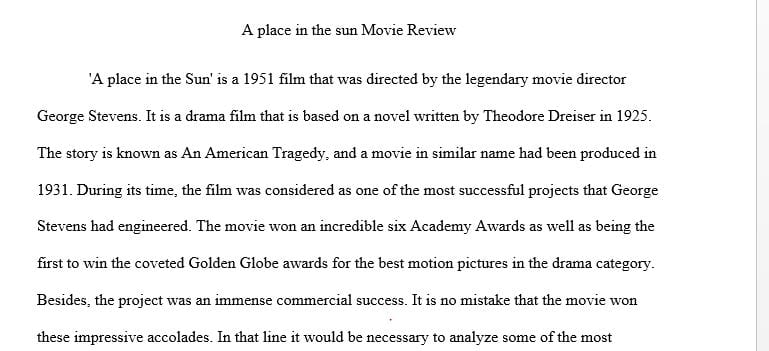Part 1: View a feature film made between 1940 – 1970 you have not seen before
Part 1: View a feature film made between 1940 – 1970 you have not seen before (nor will see later in this class) by a great director. If you would like to see an American film, consider seeing something directed by Frank Capra, George Cukor, John Ford, George Stevens, Preston Sturges, Billy Wilder, or William Wyler. If you would like to try a foreign film, consider Ingmar Bergman (Swedish), Luis Buñuel (Spanish), Claude Chabrol (French), Federico Fellini (Italian), Akira Kurosawa (Japanese), Lina Wertmuller (Italian) or the British team known as “The Archers” made up of Michael Powell and Emeric Pressburger. These are suggestions, but not a comprehensive list of possibilities. For a much more extensive list, you might want to visit http://www.filmsite.org/directors.html. (Note that many directors were active both before and after 1970. Make sure you see a pre-1970 film, make sure it’s a film you have not seen before, and make sure it is a feature. Don’t, for example, see Buñuel’s UN CHIEN ANDALOU, which is a short, not a feature.)
Comment on the specific film you saw. Pay particular attention to the camerawork (cinematography), the editing (montage), and the sound (this can include the music). What did you like, and what did you dislike, about what you saw? Why do you like the things you like, and why do you dislike the things you dislike? Is the film a good film, or is it not? (Note: This is not the same question as whether or not you liked it. It is entirely possible to like a film that you are aware is not very good.) You should comment on the film both as a representative of its genre and as a film.
Part 2: Now that you have commented on the specific film you viewed, see if you can draw some general conclusions about the work of the director and one of the main actors or actresses. For example let us say you watched the 2012 film Prometheus (no this is a not a film you can watch for this paper). Did you like Ridley Scott as a filmmaker? Did you like Michael Fassbender in the roll of an emotionless android? Why, or why not? Be sure to comment on the overall impression you had of the film, including how you see it as an example of the its genre and time period. Remember, this is not a research paper. I am interested in what you have to say, not in what you can learn by reading up on the film or the filmmaker.
Part 3: On a separate page, insert the heading “My Criteria for Quality in Film.” Under that heading, use your comments about this film and its filmmaker as guidelines toward proposing five general statements indicative of your personal taste in movies. These statements should be numbered (1) through (4), and they should be written as complete sentences or a short paragraph. It might be useful to introduce each statement with such language as “Excellent movies feature,” or “A movie is more likely to be good if,” or “A characteristic of high-quality cinema is.” (For example, if you commented in the body of your essay that you liked the acting because it was realistic and you liked the script because it had a happy ending, you could propose these two statements as criteria for quality: “(1) Excellent movies feature realistic acting. (2) A movie is more likely to be good if it ends happily.” Do not just put something like “Good movies feature good acting.” The point here is for you to think about—and then explain—what such quality words as good, excellent, and effective actually mean. Be sure to save your “My Criteria” page to your hard drive—you will be adding more items to this list and resubmitting an expanded version of it with for the second paper later in this course.
Please handle this effectively and prepare an outline for your work.
Reminder: Please follow the instructions. These assignments are reaction papers, not plot summaries or research papers. The key element here is that you will be telling the instructor what you have to say about the film, not what others have said.
Answer preview to part 1: View a feature film made between 1940 – 1970 you have not seen before
APA
1214 words



